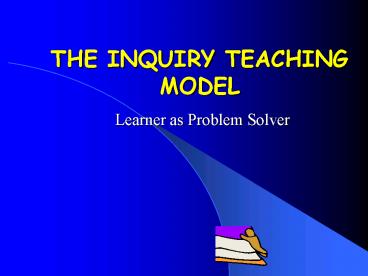THE INQUIRY TEACHING MODEL - PowerPoint PPT Presentation
1 / 18
Title:
THE INQUIRY TEACHING MODEL
Description:
Group Initiatives & New Games. Dance. VALIDATION CONT. INTUITIVE VALIDATION ... Inquiry techniques facilitate student learning without supplying the answers ... – PowerPoint PPT presentation
Number of Views:596
Avg rating:3.0/5.0
Title: THE INQUIRY TEACHING MODEL
1
THE INQUIRY TEACHING MODEL
Learner as Problem Solver
2
Questioning Problem-Solving
- Key delivery strategies for developing student
understanding - Blooms taxonomy identifies 6 levels of cognitive
knowledge - Knowledge
- Comprehension
- Application
- Analysis
- Synthesis
- Evaluation
3
MAJOR THEME
- LEARNER AS PROBLEM SOLVER
- Teacher frames the problem
- Students solve the problem cognitively, then
formulate a movement answer
4
5-STEP PROBLEM-SOLVING
- Identification of the problem
- Presentation of the problem
- Guided exploration of the problem
- Identifying refining the final solution
- Demonstration for analysis, evaluation,and
discussion
5
LEARNING DOMAIN PRIORITIES INTERACTIONS
- 1ST Priority COGNITIVE LEARNING
- 2nd Priority PSYCHOMOTOR LEARNING/FITNESS
- 3RD Priority AFFECTIVE LEARNING
6
STUDENT LEARNING PREFERENCES
- PARTICIPANT
- COLLABORATIVE
- INDEPENDENT
7
MODEL VALIDATION
- RESEARCH
- Shared decision-making, 1-5 graders, Schempp,
1982 - Critical thinking, Ennis, 1991 McBride, 1992
McBride Bonnette, 1995
8
VALIDATION CONT.
- CRAFT KNOWLEDGE
- Inquiry-based teaching prominent in p.e. for 40
years - Movement Education
- Educational Gymnastics
- Skill Themes
- Group Initiatives New Games
- Dance
9
VALIDATION CONT.
- INTUITIVE VALIDATION
- Higher order cognitive outcomes cannot be
effectively achieved with direct instruction - Inquiry techniques facilitate student learning
without supplying the answers
10
TEACHING LEARNING FEATURES
- DIRECTNESS
- Direct Interactive
Indirect - ?--------------------?
- Content Selection ?------------------?
- Managerial Control ?------------------
? - Task Presentations ?------------------
? - Engagement Patterns ?-----------------
-? - Instructional Interactiion ?---------------
---? - Pacing ?--(A)---------
(B)? - Task Progression ?------------------?
11
- PREDOMINANT ENGAGEMENT PATTERNS
- Think move
- individually
- in pairs
- in small groups
- in temporary teams
- in large groups
- as an entire class
12
- INCLUSIVENESS
- Inquiry teaching is highly inclusiveness
- All students have an opportunity to devise their
own solutions - When inductive reasoning is the focus, most
answers are acceptable to some degree
13
- TASK PRESENTATION TASK STRUCTURE
- Teacher frames the task asks the question
- Demonstrations rare
- Provides only enough information to understand
the task problem - Task structure provides parameters
- Space to be used
- Equipment to use or select from
- Grouping Safety Time Limit
14
TEACHER EXPERTISE
- TEACHER NEEDS KNOWLEDGE IN SEVERAL AREAS
- Learners
- Learning Theories
- Developmental Appropriateness
- Learning Domains Objectives
- Task Analysis Content Progression
- Assessment
- P.E. Content
- Curriculum Models
15
EFFECTIVE TEACHING SKILLS
- PLANNING
- TIME CLASS MANAGEMENT
- TASK PRESENTATION TASK STRUCTURE
- COMMUNICATION
- INSTRUCTIONAL INFORMATION
- REVIEW CLOSURE
16
CONTEXTUAL NEEDS
- ACTIVITY SPACE
- SUFFICIENT EQUIPMENT TO PREVENT WAITING TURNS
- ADEQUATE TIME FOR PROBLEM-SOLVING
17
TEACHER/STUDENT ROLES RESPONSIBILITIES
- TEACHER
STUDENT - ?---------------------
-? - Starting Class ?-------------------?
- Bringing Equipment ?-------------------?
- Content Listing ?-------------------?
- Task Presentation ?-------------------?
- Task Structure ?(A)-----------(B)?
- Content Progression ?(A)-----------------?
- Assessment (1)?------------------?
- (2)?------------------
?
18
ASSESSING LEARNING
- INFORMAL ASSESSMENT
- Checks for understanding Evaluation of responses
- FORMAL TRADITIONAL ASSESSMENT
- Quizzes computer tests worksheets skill tests
- ALTERNATIVE ASSESSMENT
- Student-peer self GPAI movement media
presentations

